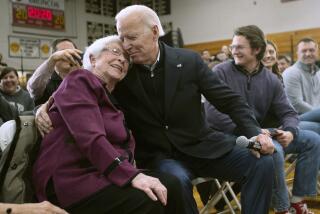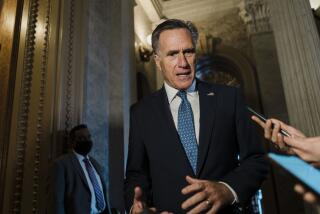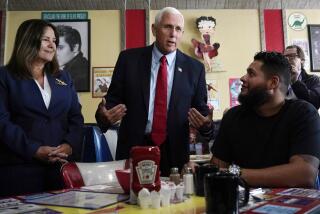Governor’s Race Draws Bush to Massachusetts
BOSTON — In Massachusetts, politics seldom brings a smile to the face of a Republican president or words of optimism to his lips.
Indeed, GOP presidents don’t generally spend much time in the home of the Kennedys, a state where the entire congressional delegation--10 House members and two senators--is Democratic.
Yet President Bush had reason for smiles and optimism on Friday, as he began two days of campaigning for New England Republicans by headlining a fund-raiser in Boston for businessman Mitt Romney.
Best known for his direction of the Olympic Games in Salt Lake City this year, Romney is the GOP gubernatorial candidate against Democrat Shannon O’Brien. And polls have shown the race is competitive.
The state’s reputation as a Democratic stronghold notwithstanding, Romney is hoping to keep alive an unusual political trend. Since 1990, when Michael S. Dukakis completed his second term, Republicans have controlled the governor’s office.
Bush did his part to keep that streak alive, helping Romney collect $1 million for his gubernatorial campaign at Friday’s event.
Happily referring to Romney as “governor,” Bush touted the candidate’s credentials to help the state’s economy. Praising Romney as a “doer,” not a “talker,” Bush said: “He started his own businesses, he’s an entrepreneur. He knows how to create jobs at a time when you need somebody in Massachusetts who knows job creation.”
Referring to the Olympics, Bush said Romney made sure the Games “were not only successful, but profitable. It’s the same kind of attitude you need here in your state budget in Massachusetts.”
At first blush, Romney would appear to be the sort of Republican who succeeds in Massachusetts. Wealthy, self-effacing and presenting himself as a political moderate, he is in the mold of the state’s most successful recent GOP politician, former Gov. William F. Weld.
But he is not as deeply rooted in the state as most Massachusetts candidates tend to be. Neither a Boston Brahmin nor an Irish Catholic, he is Mormon and son of former Gov. George Romney of Michigan. He came to Boston for his education, and stayed to make a fortune in a venture capital firm that helped Staples office supply store take off.
In O’Brien, the state treasurer, Romney also is facing a strong opponent.
A former state senator whose father long has been active in Democratic politics and whose husband is a lobbyist, O’Brien won a hard-fought primary in mid-September and rode that momentum to a small lead in recent polls.
Edmund Beard, director of the John W. McCormack Institute of Public Affairs at the University of Massachusetts Boston, said that so far, O’Brien has withstood Romney’s initial line of attack.
“Romney is trying to paint her as a member of the old boys’ network, and nobody’s buying it,” Beard said.
Despite her entrenched ties to the Democratic establishment, Romney’s charge “just won’t stick,” Beard said, because O’Brien’s a woman--one of 10 running for governorships across the country this year.
Bush, after spending the night at his parents’ summer home in Kennebunkport, Maine, is scheduled to speak today at a fund-raising lunch for the Republican Senate candidate in New Hampshire, Rep. John E. Sununu.
Sununu defeated two-term incumbent Sen. Bob Smith in a contentious GOP primary and is facing Gov. Jeanne Shaheen, a Democrat who is completing her third two-year term.
As in the Massachusetts governor’s race, polls forecast a close election.
More than anywhere else in New England, Bush offers political weight in New Hampshire, the only state he carried in the region in the 2000 election.
With the Democrats controlling the Senate by a single vote, Bush is likely to stress to his New Hampshire audience that a few votes in the sparsely populated state could have a major effect on whether Republicans become the chamber’s majority party.
Sununu--son of a former New Hampshire governor who served as White House chief of staff in the administration of Bush’s father--already has driven home that point. He asked voters whom they wanted as chairman of the Senate Education Committee: Edward M. Kennedy (D-Mass.), the liberal icon, or New Hampshire Republican Judd Gregg.
“The congressman very early made his general election campaign about that question. And the Democrats are doing the same thing,” said J. Mark Wrighton, an assistant professor of political science at the University of New Hampshire.
More to Read
Get the L.A. Times Politics newsletter
Deeply reported insights into legislation, politics and policy from Sacramento, Washington and beyond. In your inbox three times per week.
You may occasionally receive promotional content from the Los Angeles Times.










